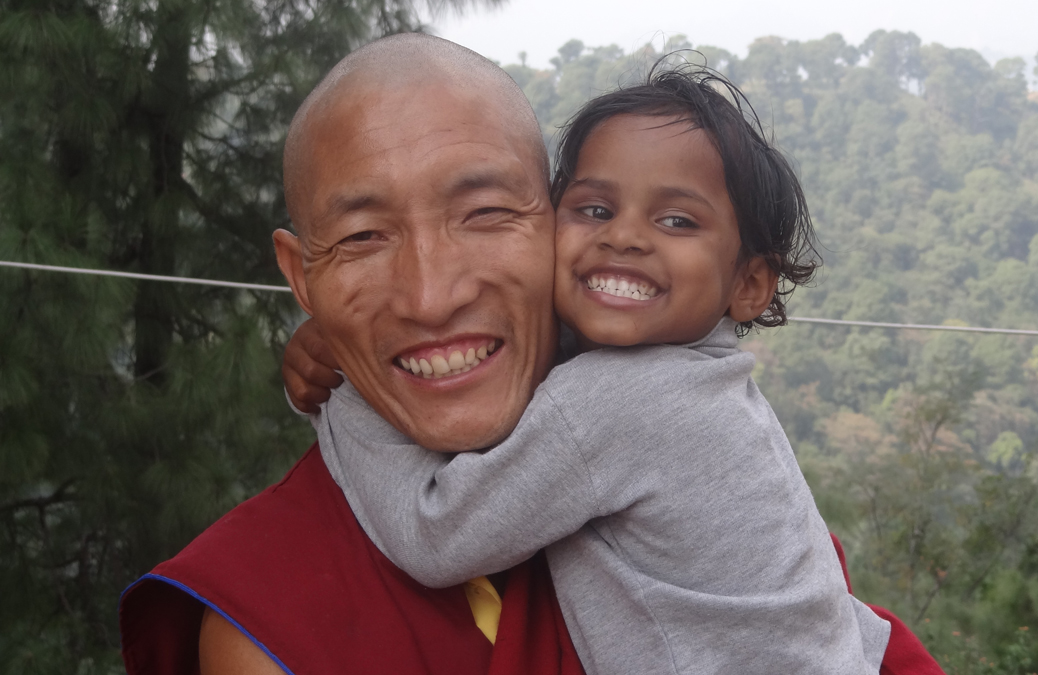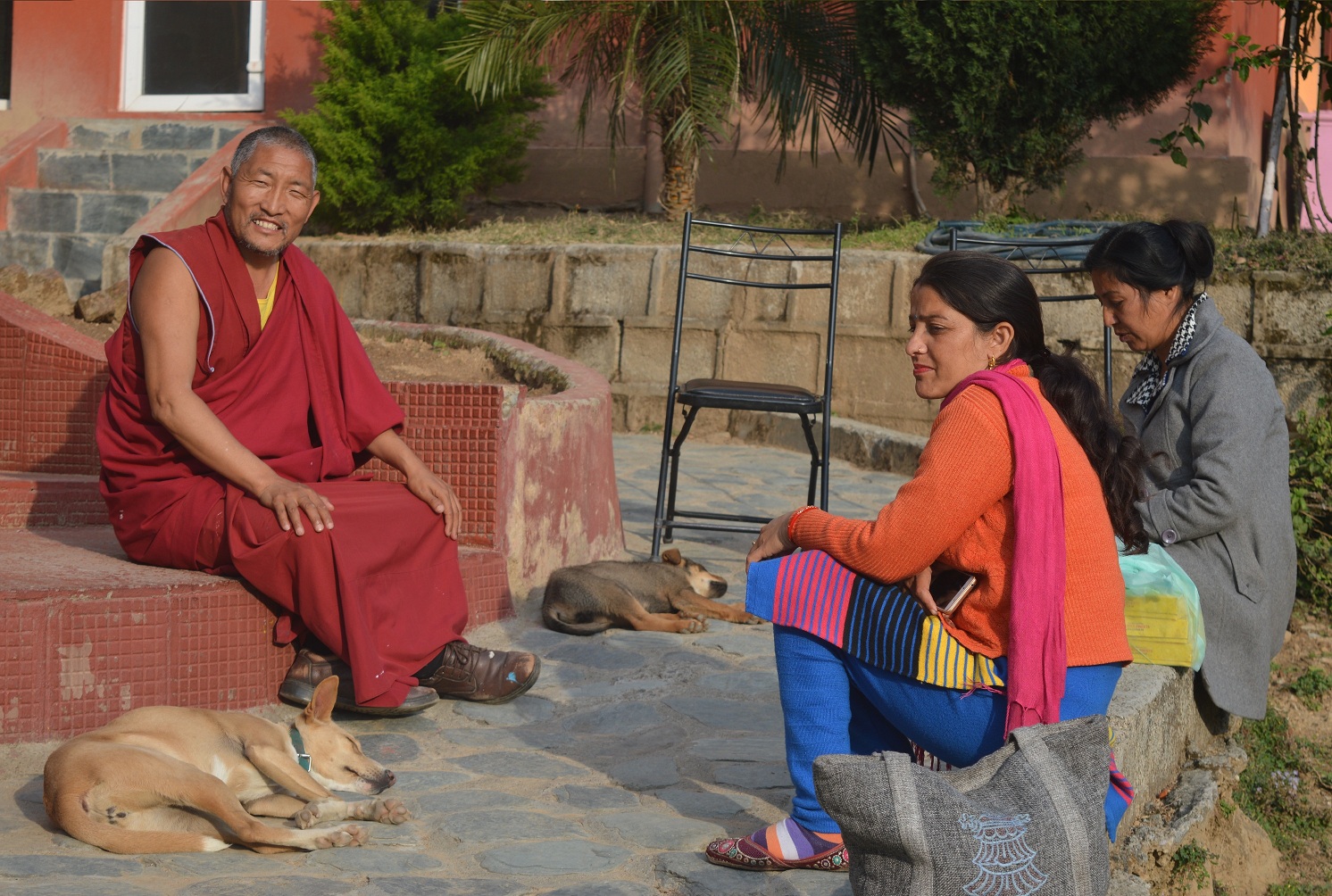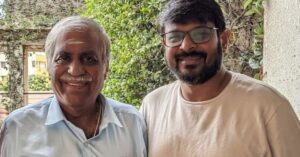Tibetan Monk Finds Heartwarming Way of Giving Back & Saying ‘Thank You, India’!
Monk Lobsang Jamyang reaches out to slums in Kangra Valley with health, education and slum welfare projects. His hostel at Sarah village is home to over 100 children from the slums.

Often, we see rag pickers and urchins begging at our car windows at signals and are sometimes irritated by them. At other times, we are not sure about how to help them get a safe and secure life. But a monk in the Kangra Valley took it upon himself to change the future of the children of the slums, who took to begging near Dharamshala and McLeod Ganj, for the better.
The name of his organisation, Tong-Len Charitable Trust, translates to ‘give and take’ in Tibetan, from the mantra of taking others’ sadness and giving back joy. That many children from the slums around Dharamshala are today studying at various universities and pursuing professional degrees is a testimony to the sheer effort of one person. And his story is one of grit, compassion and perseverance.
Lobsang Jamyang climbed the Mount Everest and crossed the treacherous pass to reach India in 1997. “It was a difficult day. I wasn’t sure if I would survive,” he recollects.

Hailing from the central Tibetan province of U–Tsang, he subsequently moved to the Sera Jey Monastery in the south Indian town of Bylakuppe.
There was emotional sickness arising from separation from his family. “In 2002, I met a man from Tibet at Bodh Gaya who said my family back home presumed that I was dead. I came to McLeod Ganj and decided to go back to my parents. But one day, I saw children begging for alms on the streets. I thought about how I could help them. I didn’t know Hindi or English then. I reasoned logically as to what were the circumstances that brought them to this condition. How we could educate all slum children,” says the 44-year-old monk.
That incident changed the course of his life, as he decided to stay back.
In 2004, he began Tong–Len Charitable Trust to reach out to the children of the many slums around Dharamshala as he felt it was important for them to get a good education along with social, ethical and emotional development.
Also Read: ‘Mother of Tibet’: Meet The Unsung Saviour of Thousands of Tibetan Children
So he went door-to-door in slums asking families to send their children to school. None of the parents was willing to send their ward to school. Education won’t give them food, they argued. They didn’t want to lose the income the children were bringing, he recollected. So he struck a deal with them. He would give Rs 150 per month as compensation for each child to stop begging and enrol in school, promised supply of food during a disaster or difficult times, food for the family if the lady of the house fell ill, free medicines and round-the-clock support for any medical exigency including major and minor operations.
“Now we are accepting more children and not giving money,” he says. Of course, none of this was easy for him. His own fraternity was wondering what he was doing apart from his ascetic duties.
Today, his organisation is active in many slums of the Kangra Valley with health, education and other slum welfare programmes.
His staff provides daycare and day-school facilities, and food delivery for over 700 infants in slums, feeding them personally.

Explaining the demography of the slums in Kangra, he says, “The slums dwellers are from Rajasthan and Maharashtra who migrated here due to adverse weather conditions back home during the 60s and 70s. They came here via Delhi, Manali and Punjab. They are extremely poor and lead a gypsy life. Women cut grass or go begging. Children and women are victimised in slums and alcoholism among men is common. Diseases are rampant and so is malnourishment among children. There are also social issues such as early marriages.”
His hostel at Sarah village is home to over 100 children of various age groups from the various slums. Some attend the local school Dayanand Model Senior Secondary School, and the older ones prepare for competitive exams. School buses and ambulances stand outside the brightly-coloured building that has a basketball court, a play area for tiny tots and a stage where students have given a presentation to His Holiness The Dalai Lama during his visit here. The 24×7 health programme, ambulance and nurses for the slums are supported by The Dalai Lama Trust.
A European Space Agency studio enables student interaction with international scientists while management professionals connect with the students from across the world.
“The design and colour scheme for the buildings was planned by children who gave their inputs to the architect,” shares the monk. It is no wonder that the products are brimming with confidence.
Pinky has been at Tong-Len since she was five. Her parents stay in a slum and have moved places due to evacuation drives. Today, she is preparing for the National Eligibility cum Entrance Test (NEET) and wants to be a doctor.
Kishan, another resident at the hostel, hails from Rajasthan. His parents too live in a slum near Dharamshala. He is pursuing hotel management at a nearby college, while Vijay is currently in the second year of his BCom degree and plans to be a Chartered Accountant.
Coaching for students who want to opt for professional streams such as engineering and medicine is made available.
The monk fondly remembers his favourite child. “There was a little girl named Nisha Kumari who tugged at my robe, begging for a banana or alms. She would chase me up the temple stairs in McLeod Ganj and then run after tourists at the bus stand. Today, she is studying Journalism in Bengaluru and plans to go to the USA for her master’s degree,” he says.
He continues, “Children visit their parents during holidays. I give them three ‘Lakshyas’–a good life for themselves, the responsibility of their families and a commitment to serving the community and country.”
This year, the premises at Sarah will also have a school wing. From the current academic year, classes will be conducted on the campus. “Social, emotional, ethical learning, the current thought followed in schools in Europe and the United States of America, would be a key focus in our curriculum apart from skill development and critical thinking. We have had great universities such as Nalanda in India. We need to revive the rich Indian culture. We are looking for measurable results,” he says.
His trust has branches in the United Kingdom, the United States of America, France and a support group in Australia. Volunteers do drop in from Brazil and other regions of the world to impart knowledge to the children and philanthropists from international organisations extend their support to the cause. “We have tied up with Bain & Company, one of the best consultancy firms in the world,” he says about the Boston–based company, seeking the best for his projects.
The sun sets on the snow-clad Dhauladhar ranges facing the hostel building and the evening grows cool. The monk waves adieu and is huddled by eager students as he walks back to get some rest. There is a new day ahead and lots of work to do.
You May Also Like: The Extraordinary Ladakhi Monk Who Helped Bring Peaceful Democracy to Mongolia
On a personal front, monk Lobsang Jamyang was finally able to connect with his family in 2010. “We didn’t speak for two days as we wept over the phone. My mother wept on one end of the line the first day, and the next day it was me. The third day, we spoke. Now technology comes useful. You can use web chat. The hard time has almost gone,” he says, as he dedicates his life for the service of humanity.
Kudos to the monk who has given a new lease of life to slum children in Dharamshala. “It was an opportunity to give back and say, ‘Thank you India’,” he concludes.
(Written by Syeda Farida and Edited by Shruti Singhal)
Like this story? Or have something to share? Write to us: [email protected]
Connect with us on Facebook and Twitter.
NEW: Click here to get positive news on WhatsApp!

Similar Story

‘I Had Decided to Drop Out of IIT Entrance Exams, Until My Dad’s Words Changed My Life’
Ganesh Balakrishnan’s life took a turn when he faced health issues a month before his IIT-JEE exam. Despite feeling disheartened and at the verge of dropping out, his father’s advice helped him overturn his luck.
Read more >
If you found our stories insightful, informative, or even just enjoyable, we invite you to consider making a voluntary payment to support the work we do at The Better India. Your contribution helps us continue producing quality content that educates, inspires, and drives positive change.
Choose one of the payment options below for your contribution-
By paying for the stories you value, you directly contribute to sustaining our efforts focused on making a difference in the world. Together, let's ensure that impactful stories continue to be told and shared, enriching lives and communities alike.
Thank you for your support. Here are some frequently asked questions you might find helpful to know why you are contributing?


This story made me
-
97
-
121
-
89
-
167












